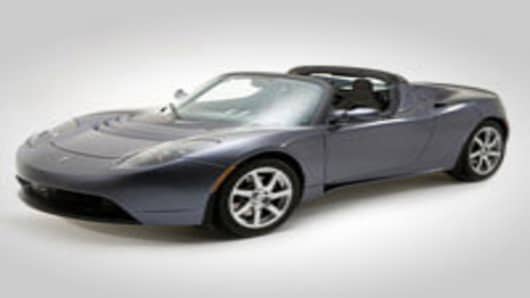Ray Lane's got a bone to pick with Detroit and Washington: quit your whining, partner up with innovators here in Silicon Valley, and consumers, investors, auto industry workers, politicians, executives and America will be better off for it.
I spent some time talking to Lane, formerly the president of Oracle Corp., and now a general partner at the vaunted Silicon Valley venture capital firm Kleiner Perkins Caufield & Byers, overseeing a $1 billion green investment fund with a heavy emphasis on green transportation. Everything from new vehicles, like the super-slick Fisker Karma, to biofuels and battery technology.
He's annoyed. Annoyed that everyone seems to be colored by the millions of jobs that might be lost from an auto industry bail-out. Annoyed that $10 billion or $14 billion or $25 billion today, will be more of the same a few months from now. And the cycle won't end. And Washington will sink the nation into a never-ending money pit of despair and anachronistic business models that no longer make sense. Or dollars for that matter.
But rather than take the elitist approach -- Silicon Valley can do it better no matter what -- that almost sunk Tesla Motors, Lane is advocating what he calls "co-optician," or a blend of cooperation and competition. Tesla's Elon Musk, who has sunk better than $55 million of his own money in the company, made headlines by saying that Tesla's attraction to investors was that it was made up of automotive industry outsiders who weren't tainted by an industry gone bad.
He found out the hard and expensive way that his approach was not a good one. Tesla's been plagued by operational issues, a revolving door of CEOs, manufacturing delays that have stretched its 1,000 name wait-list to years long and investor problems that threatened its very viability.
Lane wants more a partnership between Detroit and Silicon Valley; wanting the Big 3 to outsource their innovation to this far more entrepreneurial region. His approach makes a lot of sense.
"I have one company that's going to be building 500,000 vehicles by Americans, sold to America, and I can do that for $200 million or $300 million. I don't need a billion dollars. Fisker will deliver and be cash-flow profitable on a couple of hundred million dollars. It doesn't need $25 billion," Lane tells me.
Read that last quote again. That's pretty compelling.
He goes on to tell me, "Detroit should be looking at Silicon Valley as a close partnership, and maybe even outsource some of its innovation to Silicon Valley and we would have a stronger industry in America. We'd have a stronger automobile industry than Europe or Asia could ever devise because they do not have Silicon Valleys. We're not using, and Detroit is not using Silicon Valley to its advantage and that's a mistake. And if the US government doesn't do that, doesn't see if that way, and starts writing checks to the Big 3 without including Silicon Valley, huge, huge mistake."
Don't be mistaken: Lane isn't getting in line for a bail-out, or holding out his hand for taxpayer money. He doesn't need it. Doesn't want it. What he does want is a fundamental change in the industry that forces new innovation and a shift in the Detroit business model.
"We ought to demand that each of the Big 3 change themselves from the inside out; deliver the products that consumers want; pare themselves down to an operating philosophy that is profitable," says Lane. He freely acknowledges this might take bankruptcies to effect, but that's the tough pill that needs to be swallowed.
"If we flow through $25 or $40 billion without demanding the changes that are required," it would be tragic, he says. And with those changes will come a better Detroit, a better Silicon Valley, and a better, stronger nation coast to coast.
Just one man's perspective. But it's a perspective that ought to matter.
Questions? Comments? TechCheck@cnbc.com


